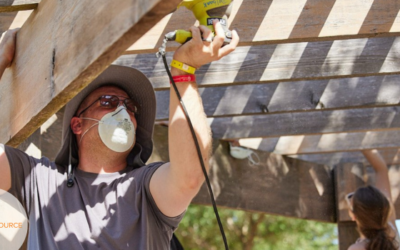Download a PDF of the Bible Study: Let’s Talk – Hurting Families.
INTRODUCTION
Perhaps it would be more appropriate for me to write an article like this in the third person but I just can’t do it. Caring for people in families is just too personal to me. I have sat in anger and despair wondering what I could do to help young people whose present and future were jeopardized by the dysfunctional lives of those who were raising them. I have been frustrated by my legal powerlessness to help and defeated by my inability to make a difference. I have also seen personally that efforts I thought were fruitless can blossom in the lives of young people who return later to say to those who reached out, “I am where I am today because you believed in me,” or, “You showed me there was another way.” Research on “resiliency” backs that up (Williams 1985). Many of those who have overcome great obstacles in their life did so because of one or more adults in their life who encouraged another way. What a privilege and awesome responsibility! Who is God calling you to be that “one person” for?
Warning! It is dangerous and irresponsible to help a young person confront dysfunction in their family or personal life without being willing and able to walk the rest of the path with them or connect them with someone who will. Education can be a careless way to point out to someone how dismal their family life is. That leads to despair not hope. Don’t open a door you’re not willing to walk through.
This study is designed to do several things. First, it is designed to educate the adult leader by providing him/her with background information related to this issue. Also, through this study, adult leaders will have hope and resources to help youth in troubled families become “resilient.” Both youth and adults will explore biblical resources for difficult times and situations. Finally, this study is designed to proclaim God’s grace to hurting teens and families.
SUGGESTED USES FOR THIS RESOURCE
- Use for Sunday morning Bible study.
- Plan a youth night around the topic of hurting families using this piece as the focus.
- Discuss families during a lock-in or weekend retreat.
- Make a copy of the questions page for a youth who comes to you with a concern or question.
- Use to train adult youth group leaders.
Leader’s Guide
I. What’s a healthy family anyway? (Background Information for Leaders)
Sociology professor Phillip Kunz completed a study on effective or happy families. According to Kunz, happy families have specific characteristics. The opposites listed are suggested by family systems theory and research.
Happy Families Unhappy Families
display affection withhold or rarely display affection
talk out problems deny or are unable to identify problems
emphasize love and family unity emphasize “not letting others know”
take part in religious activities marginal or no religious participation
set goals for education and finances misuse of debt, financial problems
do chores together home may be in total disarray
work together in times of adversity become isolated in adversity
enjoy family friends others are kept outside or away
are led by parents who have a solid little leadership at home, high stress
relationship relationships
The difference isn’t the absence of problems or crises. God made us and brought us into families to be happy and blessed (Psalms 127 & 128). The Bible pictures our relationship with the Lord in family language (Ephesians 5:21-33). Sin distorts all that and has from the beginning. How Adam and Eve must have grieved to see one beloved son kill the other. We sin against God and each other. Forgiveness for our sins is a dynamic power which we have through Jesus Christ and share with each other (John 29:21-33). Anything that destroys caring communication, love, the valuing of one another and the dynamics of forgiveness makes that family unhealthy.
Family systems theory studies the way a family functions. Just as a body is made of systems that work together in carefully balanced ways to maintain health, so do the individuals in a family. Healthy families are more evenly balanced. There is a healthy interdependence among members. Humor, respect, listening, fun, togetherness and share responsibility exist. Members lead and members follow. When members disagree with each other, love doesn’t stop. Even when they sharply disagree, confession, repentance and forgiveness are shared freely. Love is shared and exchanged in even ways. When one member experiences pain, the others feel it, too. Healthy families react in love. In a balanced family system problems are discussed and dealt with. Rules exist but they are fair and flexible when they need to be. Consequences “fit” the crime.
Balance is skewed or “out of whack” in unhappy families which may be described as rigid, chaotic, disengaged or enmeshed. “Rigid” family systems have autocratic and legalistic leaders. Discipline is strict and often harsh. Loyalty and compliance are highly valued. “Chaotic” family systems are just the opposite. They lack leadership and there are few rules. Discipline is whimsical or impulsive. children often assume parental roles. “Disengaged” families lack emotional closeness with one another. Often a “scapegoat” in the family unfairly bears problems and consequences. Estrangement is common and there is too much independence among members who lack an intimate relationship with one another. In contrast, “enmeshed” families are characterized by unhealthy closeness. Members are entangled in relationships that suffer from a lack of boundaries. Members may feel smothered or suffocated.
Unhealthy families often have rules, spoken or unspoken. Common ones are:
- Don’t communicate—keep family secrets. It’s wrong to speak openly.
- Don’t trust—Security and safety aren’t real. Emotional distance is less risky.
- Don’t feel—Affection isn’t openly displayed. Emotion is dangerous.
Even a family that starts out healthy can be thrown into long-term imbalance by one or more members in spiritual and emotional pain because of addiction, abuse or mental illness. Addictions and abuse badly damage healthy relationships of love and support, they healthy exchange of feelings and needs, confession and forgiveness. The family’s focus is distorted. Communication is cut. Positive messages are not shared. Affirmation of one another breaks down. Fear is high and self esteem is low.
II. The Role of a Volunteer Youth Leader
As a volunteer youth leader in the church, your impact can be tremendous in a young person’s life. one person may be all that stands between them and a bright or dismal future. You can’t “fix” their families for them. You can…
- Open your home: Invite teens to visit and be part of your stable home life. Gives them a glimpse of marriage and family life that they may not be experiencing.
- Peer Ministry: Consider arming all your teens with great communication and caring skills. “Peer Ministry” training is one way to do that.
- Offer confidential scholarships and personal invitations for youth gatherings or servant events to youth who might “need” to go but might otherwise not even dream of attending.
- Educate more people. Have occasional speakers from “help sources” in your community so people are aware of where to get help. Try to find guests to speak who can tell their own story of how they overcame adversity.
- Build on their strengths. Tell youth their strengths verbally and often. They may be focused on themselves and suffering badly from a self esteem that barely exists. Helping a young person to discover and develop a strength and inoculation against despair.
- Research for referral to professionals. Some problems are too big for you. Look online or in your phone book’s yellow pages under Alcoholism; Crisis Intervention; Social Services; Marriage, Family and Child Counselors; Counselors and Human Services organizations. Sometimes stressed families need a little help walking to and through the process of seeking help.
- Pray: Focus in on the problems your teens are facing and pray for them diligently.
- Find out about “Asset Building.” Research by Search Institute has identified 40 “developmental assets” that young people need to grow up healthy. Youth with more of these assets make fewer harmful decisions. Promoting assets is preventative medicine. Find more information at http://www.search-institute.org/research/developmental-assets.
- Consider mentoring: Develop a one-on-one relationship with a teen. Serve as a sounding board, share your skills or just be a great encourager.
- Make your youth group a safe place. Enforce a “no put down” rule. Plan to help youth develop a sense of community and caring with one another.
- Build a balanced family life in your home. Analyze your family’s communication, structure and history. Are you so busy at church that you’re never home? Do you have hobbies? friends? close relationships? What can you do to bring balance into your life?
- Be careful when you promote or require parental support. Some youth have none.
- Explode the myths! The past wasn’t better. In the 19th century half of all children died before they reached their teens. Child labor was common. Domestic violence and desertion rose sharply during the Depression. Murder rates were as high in the 1930’s as they were in the 1980’s. The teenage birthrate was twice as high in 1957 as it is today.
(“Being Healthy in an Unhealthy Family,” originally written by Don Taylor, published in Youth Ministry Quarterly 89:3, rewritten and updated by Jill Hasstedt in 1999.)
Updated for youthESource April 2015






0 Comments